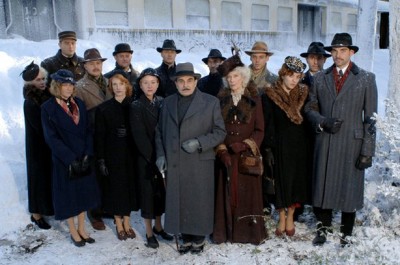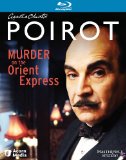| Reviews & Columns |
|
Reviews DVD TV on DVD Blu-ray 4K UHD International DVDs In Theaters Reviews by Studio Video Games Features Collector Series DVDs Easter Egg Database Interviews DVD Talk Radio Feature Articles Columns Anime Talk DVD Savant Horror DVDs The M.O.D. Squad Art House HD Talk Silent DVD
|
DVD Talk Forum |
|
|
| Resources |
|
DVD Price Search Customer Service #'s RCE Info Links |
|
Columns
|
|
|
Agatha Christie - Poirot: Murder on the Orient Express
Adapted from Christie's iconic 1934 novel, Murder on the Orient Express was previously adapted as a superb, all-star theatrical feature released in 1974, a daunting precedent that this new version struggles to overcome. Though not entirely successful the new Orient Express admirably goes its own way and is very different from the 1974 film throughout. Some of the new wrinkles that writer Stewart Harcourt and director Philip Martin add are interesting and original, while other changes come off terribly misguided and lose sight of Poirot's essential appeal.
In terms of marketing, Acorn Media's timing of this release is equally misguided and needlessly confusing. In late-July, they released this same Murder on the Orient Express to standard-def DVD as one-third of a pricey ($49.99) set of TV-movies, the others being Third Girl (2008) and Appointment with Death (2009). Meanwhile, three other Poirot stories filmed after these but before Orient Express still sit unreleased. In other words, the label jumped the gun by including it as part of Agatha Christie Poirot: The Movie Collection, Set 5, effectively dampening all enthusiasm for the Blu-ray. If you purchased that set, it's unlikely you waited until now to watch Murder on the Orient Express and yet Poirot's loyal fans are expected to double-dip on releases barely three months apart.
The 1974 Murder on the Orient Express, directed by Sidney Lumet and starring Albert Finney as Poirot, proved so popular that it spurred an Agatha Christie revival which led to more movies and, subsequently, the Joan Hickson Miss Marple and David Suchet Poirot TV series.
The new version couldn't hope to compete with the original's peerless, all-star cast (Sean Connery, Ingrid Bergman, Lauren Bacall, et. al.) Moreover, the complex, unusual story necessitated a general faithfulness to Christie's original yet, obviously, the filmmakers didn't want this to appear a cheap carbon copy of the earlier picture.
Fortunately, director Philip Martin (Prime Suspect: The Final Act) and writer Stewart Harcourt (Marple) make the right decisions about 80% of the time. The result is a Murder on the Orient Express that's pretty faithful to Christie but stylistically far removed from Lumet's film and with a few intriguing, ambitious additions. Though some of these don't work, it's a legitimate, satisfying adaptation, much more so than I was anticipating.
The familiar story begins in Istanbul, where Poirot boards the Orient Express. An unpleasant, bossy American, Samuel Ratchett (Toby Jones), crudely tries to hire Poirot to investigate vague threats on his life. Poirot refuses and later, in the snowy mountains near Belgrade, Ratchett is murdered during the night, stabbed a dozen times in his First Class compartment. Wanting to avoid a troublesome investigation by Yugoslavian authorities, line director M. Bouc (Serge Hazanavicius) persuades Poirot to investigate the murder. After going over the crime scene with Dr. Stavros Constantine (Samuel West), the Belgian detective begins interviewing the other passengers.
To Poirot's shock and frustration, all of the first- and second-class passengers in Ratchett's car seem to be hiding something: Hector MacQueen (Brian J. Smith), Ratchett's personal secretary; Masterman (Hugh Bonneville), Ratchett's valet; Pierre Michel (Denis Menochet), the French conductor of the coach; Mary Debenham (Leigh Allyn Baker), a young British woman, who appears to be conspiring with Colonel Arbuthnot (David Morrissey), a British army officer returning from India; Princess Natalia Dragomiroff (Eileen Atkins), an elegant, elderly White Russian traveling with Hildegarde Schmidt (Susanne Lothar), her German maid; Hungarian diplomat Count Rudolph Andrenyi (Stanley Weber) and his wife, the Countess Helena (Elena Satine); Swedish missionary Greta Ohlsson (Marie-Josée Croze), a devoutly religious Christian convert; Mrs. Hubbard (Barbara Hershey), a demanding American woman; and Antonio Foscarelli (Joseph Mawle), an Italian businessman.
Wisely, the filmmakers didn't even try to pack their Orient Express with big-name stars; Barbara Hershey is about the only "name" in the cast, though a few faces, like Tony Stephens (wonderfully toady as Karl Rove in Oliver Stone's W), may be familiar to viewers.
The story is basically the same but the approach differs starkly from the 1974 feature film. Where that version was generally light and frothy, bathed in a nostalgia for pre-war continental glamour, Murder is dark and ominous, Christian Henson's relentlessly pounding music effectively underscoring this. The 1974 Orient Express was elegant, stately; this train is more like the Horror Express (1973), racing headlong into chaos. Of course, Suchet's Poirot was always quite different from Albert Finney's delightful interpretation, and for this story especially the differences between the two are starkly emphasized. Finney's Poirot was a gravelly-voiced Belgian dandy, eccentric and excitable - theatrical. By contrast, Suchet's increasingly solitary and introspective, fussy and mannered Poirot is so subdued here that during the dénouement his voice is barely above a whisper. I don't think he smiles once, and is atypically petulant throughout, the very opposite of Finney's portrayal. (Most of the recent TV movies have inexplicably shifted Poirot away from the anal but pleasant Continental gentleman and toward an almost unpleasant, impatient grouch. Surely they are aware of this?)
(Warning: Major Spoilers) In addition to some perplexing and unnecessary cosmetic changes there's one admirably ambitious if somewhat muddled addition: Murder on the Orient Express is presented as a religious and moral dilemma for Poirot, and this internal struggle, an original concept, becomes this adaptation's backbone, like it or not.
In Istanbul, Poirot and Mary Debenham watch helplessly as an adulteress is stoned to death by a mob in the street right in front of them. Though horrified, Poirot insists that the woman understood the consequences of disobeying her culture's rules. However, when the murderer(s) argue essentially the same point: Ratchett is revealed to have himself murdered an innocent toddler (in events inspired by the Lindbergh kidnapping). In the end, Ratchett escaped ordinary justice and profited by his actions. Should not the victims and grieving survivors therefore be entitled to mete out moral justice?
Poirot's Catholic faith - we see him pray devoutly, possibly for the first time in the entire Poirot series - and trust in the Rule of Law tells him no, but the terrible, far-reaching impact of Ratchett's crime weigh heavily on Poirot's conscience.
Technically, this show is handsome and polished. Exteriors of the train are mostly CGI shots that are an improvement over the notably phony ones in The Mystery of the Blue Train, but still unreal - especially in high-definition.
Video & Audio
Rather surprisingly, I didn't notice all that much of a bump between the standard-def DVD of Murder on the Orient Express and its 1080p counterpart, chiefly because the deliberately fidgety, shallow-focus and hand-held photography, shallow even in tight close-ups, lacks the consistent, razor-sharp clarity often expected in high-def television photography today. Ironically, the 1080i travelogue about the real Orient Express, included as an extra feature, is much more satisfying in this regard. The DTS-HD Master Audio is effective, however, and supported by SDH subtitles.
Extra Features.
Beyond Acorn's usual text filmographies, list of Poirot novels, and presskit-type announcement regarding "120 Years with Agatha Christie" is an enjoyable 47-minute documentary, David Suchet on the Orient Express, with the actor, out-of-character (always a jarring experience post-Poirot) and all smiles, hosting a tour of the world's most famous train service. The train has been restored and is exquisitely beautiful but also prohibitively expensive (no prices are mentioned, but according to the company's website, the trip Suchet enjoys would run at least $14,000!), making it a vicariously enjoyed experience. However, Suchet's delight is contagious.
Parting Thoughts
If you already own this as a standard-def DVD, I can't recommend that you rush out and upgrade to this Blu-ray version because the bump isn't all that great and the disc is relatively expensive, considering. Those who've never experienced the pleasure of the David Suchet Poirots might want to give this a try; it's far from the best the series has offered, but it is accessible and reasonably enjoyable, and for this demographic is modestly Recommended.
Stuart Galbraith IV's latest audio commentary, for AnimEigo's Musashi Miyamoto DVD boxed set, is on sale now.
|
| Popular Reviews |
| Sponsored Links |
|
|
| Sponsored Links |
|
|
| Release List | Reviews | Shop | Newsletter | Forum | DVD Giveaways | Blu-Ray | Advertise |
|
Copyright 2024 DVDTalk.com All Rights Reserved. Legal Info, Privacy Policy, Terms of Use,
Manage Preferences,
Your Privacy Choices | |||||||














